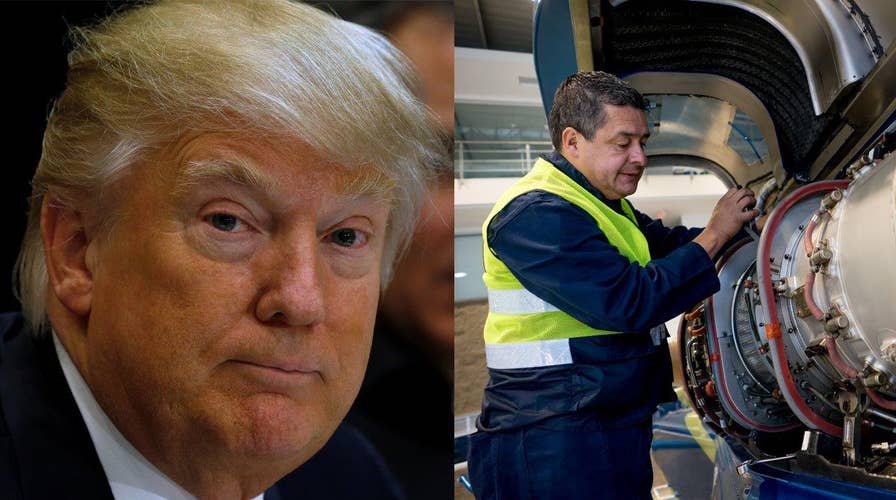American flight industry jobs in trouble?
Gregg Jarrett talks to Captain Greg Everhard regarding a decision by the Department of Transportation that critics say poses a big threat to American flight industry jobs
Japan, which has a consistent trade surplus with the U.S., is putting the finishing touches on a package that it claims will create 700,000 jobs in the U.S. and help create a $450-billion market, Reuters reported, citing government sources familiar with the plans.
Prime Minister Shinzo Abe and President Trump are expected to meet on Feb. 10. Major Japanese newspapers cited a draft of the proposal that calls for cooperation on building high-speed trains in the U.S. northeast, Texas and California. The two sides would also jointly develop artificial intelligence, robotics, space and Internet technology.
The Japanese may use money from its foreign exchange reserves to fund the package, Reuters reported.
TRUMP WALKS BACK ON SUPPORT OF NEW ISRAEL SETTLEMENTS
On a broader basis, the two countries would cooperate in building liquefied natural gas facilities in Asia to help expand exports of U.S. natural gas and work together to expand nuclear energy-related sales.
The aim appears to be to turn what could potentially be a major crisis over trade friction into a business opportunity for both sides.
Abe's proposed public-private initiative is intended to create several hundred thousand jobs, the reports said Thursday, and involve $150 billion in new investment in U.S. infrastructure from Japanese government and private sources over the next decade.
Asked in parliament about his plans for talks with Trump, Abe said Japanese companies are making significant contributions to the U.S. economy.
TRUMP ADMINISTRAITION SET TO TAKE ON DODD-FRANK LAW
"Toyota has been making big investments in the U.S. It has built big factories, created jobs. If they make profits, their salaries increase and the benefits for Japan also grow. It's important for each of us to think that way," Abe said. "If the United States grows, without a doubt that benefits Japan."
Overall, the expectation is that the plan would generate $450 billion in new business.
The government pension fund may invest in the projects, the reports said. Such investments can raise controversy over risk management of funds relied upon by millions of people in their retirement.
Earlier this week, Abe and other officials rejected accusations by Trump that Japan is deliberately seeking to devalue the yen to help its export sector.
Abe has been grilled repeatedly in parliament over Trump's rejection of a regional trade initiative, the Trans-Pacific Partnership, and over how he plans to handle friction over trade, saying he believed it was possible to strike a bilateral agreement with the Trump administration.
Trump's complaints over Japanese not buying many U.S.-made cars drew a stern response from Akio Toyoda, president of Toyota Motor Corp.
"We are already producing extremely large numbers of cars in the U.S. We are one of American manufacturers, aren't we? I hope President Trump understands that," he told reporters at an event Thursday.
The Associated Press contributed to this report





